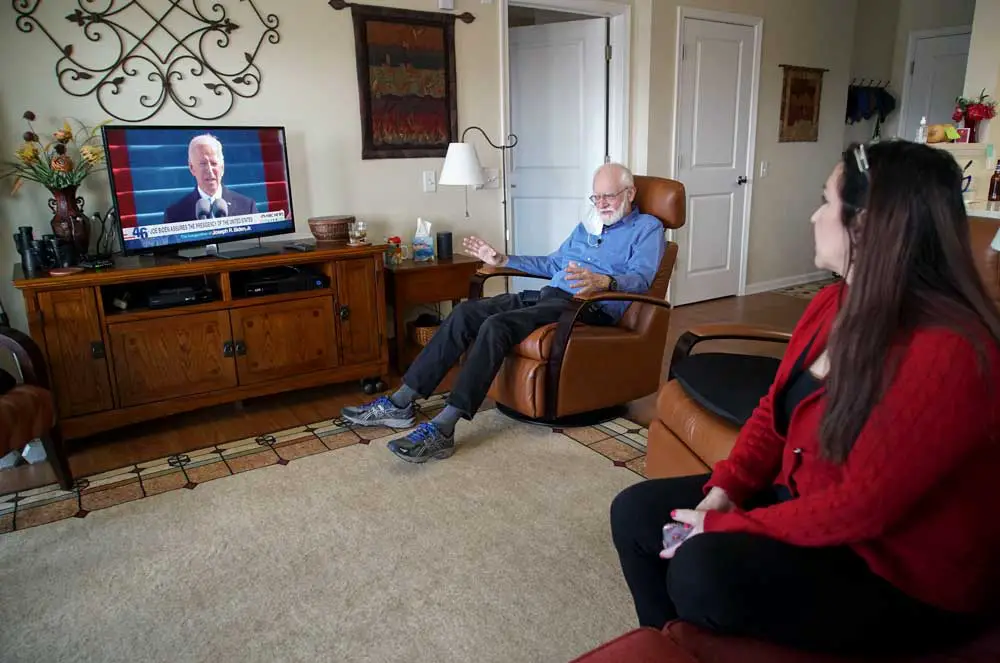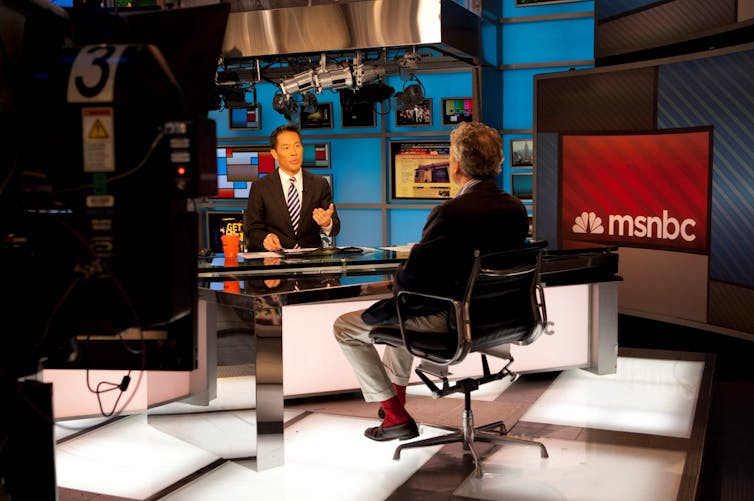
By Homa Hosseinmardi
The past two election cycles have seen an explosion of attention given to “echo chambers,” or communities where a narrow set of views makes people less likely to challenge their own opinions. Much of this concern has focused on the rise of social media, which has radically transformed the information ecosystem.
However, when scientists investigated social media echo chambers, they found surprisingly little evidence of them on a large scale – or at least none on a scale large enough to warrant the growing concerns. And yet, selective exposure to news does increase polarization. This suggested that these studies missed part of the picture of Americans’ news consumption patterns. Crucially, they did not factor in a major component of the average American’s experience of news: television.
To fill in this gap, I and a group of researchers from Stanford University, the University of Pennsylvania and Microsoft Research tracked the TV news consumption habits of tens of thousands of American adults each month from 2016 through 2019. We discovered four aspects of news consumption that, when taken together, paint an unsettling picture of the TV news ecosystem.
TV trumps online
We first measured just how politically siloed American news consumers really are across TV and the web. Averaging over the four years of our observations, we found that roughly 17% of Americans are politically polarized – 8.7% to the left and 8.4% to the right – based on their TV news consumption. That’s three to four times higher than the average percentage of Americans polarized by online news.
Moreover, the percentage of Americans polarized via TV ranged as high as 23% at its peak in November 2016, the month in which Donald Trump was elected president. A second spike occurred in the months leading into December 2018, following the “blue wave” midterm elections in which a record number of Democratic campaign ads were aired on TV. The timing of these two spikes suggests a clear connection between content choices and events in the political arena.
Staying in TV echo chambers
Besides being more politically siloed on average, our research found that TV news consumers are much more likely than web consumers to maintain the same partisan news diets over time: after six months, left-leaning TV audiences are 10 times more likely to remain segregated than left-leaning online audiences, and right-leaning audiences are 4.5 times more likely than their online counterparts.
While these figures may seem intimidating, it is important to keep in mind that even among TV viewers, about 70% of right-leaning viewers and about 80% of left-leaning viewers do switch their news diets within six months. To the extent that long-lasting echo chambers do exist, then, they include only about 4% of the population.
Narrow TV diets
Partisan segregation among TV audiences goes even further than left- and right-leaning sources, we found. We identified seven broad buckets of TV news sources, then used these archetypes to determine what a typical unvaried TV news diet really looks like.
We found that, compared to online audiences, partisan TV news consumers tend not to stray too far from their narrow sets of preferred news sources. For example, most Americans who consume mostly MSNBC rarely consume news from any other source besides CNN. Similarly, most Americans who consume mostly Fox News Channel do not venture beyond that network at all. This finding contrasts with data from online news consumers, who still receive sizable amounts of news from outside their main archetype.

Mikeblog/Wikimedia, CC BY-SA
Distilling partisanship
Finally, we found an imbalance between partisan TV news channels and the broader TV news environment. Our observations revealed that Americans are turning away from national TV news generally in substantial numbers – and crucially, this exodus is more from centrist news buckets than from left- or right-leaning ones. Within the remaining TV news audience, we found movement from broadcast news to cable news, trending toward MSNBC and Fox News.
Together, these trends reveal a counterintuitive finding: Although the overall TV news audience is shrinking, the partisan TV news audience is growing. This means that the audience as a whole is in the process of being “distilled” – remaining TV viewers are growing increasingly partisan, and the partisan proportion of TV news consumers is on the rise.
Why it matters
Exposure to opposing views is critical for functional democratic processes. It allows for self-reflection and tempers hostility toward political outgroups, whereas only interacting with similar views in political echo chambers makes people more entrenched in their own opinions. If echo chambers truly are as widespread as recent attention has made them out to be, it can have major consequences for the health of democracy.
Our findings suggest that television – not the web – is the top driver of partisan audience segregation among Americans. It is important to note that the vast majority of Americans still consume relatively balanced news diets.
However, given that the partisan TV news audience alone consumes more minutes of news than the entire online news audience, it may be worth devoting more attention to this huge and increasingly politicized part of the information ecosystem.
![]()
Homa Hosseinmardi is Associate Research Scientist in Computational Social Science, University of Pennsylvania.






























Anonymous says
People have a tendency to believe everything they hear, see and read instead of doing their own research
James says
Don’t have cable TV… why pay for something that has just as many commercial interruptions as broadcast TV?
Stephen Smith says
I agree. Cable news is responsible for the polarization of American politics as well as ideology. When 24 hour news channels first came into existence they actually were just that, News channels. Then the cost of obtaining news 24/7 that would bring in viewers and advertising skyrocketed. News channels then turned to opinion and the talking heads were born. These opinionists quickly realized that they could gather viewers and sponsors by pandering to their audiences fears and prejudice. Thus began the competition for viewers and the opinions became more and more polarizing under the guise now of entertainment, with the talking heads becoming stars with fan clubs.
Herman says
Same can be said for “News” sites such as FlaglerLive…. While Flaglerlive provides A TON of great and valuable information for our area, 90% of it is one big liberal editorial. It is unable to just present the news and let people draw their own opinion and is not capable of standing straight… It always leans left.
Sherry says
@ Herman and Riley. . . Flaglerlive presents factual investigative reporting that often reveals weaknesses/mistakes in our local governmental institutions. Flaglerlive news happens to appear liberal because the VAST majority of those in local political office are Republican . . . unfortunately, many are incompetant buffons and bullies. The FACTS simply do not look good for the Republican party.
Yes, the Flaglerlive “editorials” lean liberal in order to attempt some amount of “balance” in a state that is “overwhemly” Republican. . . regardless of the facts.
Sherry says
that is overwhelmingly. . . sorry
tedneves says
Although I agree with you on Flagler lives reporting on the weaknesses & mistakes and corruption within our local government institutions the problem i see is is anything Republican gets bashed from Trump to DeSantis and other elected Republicans outside our local government, but honestly I can’t recall any stories that related to Hillary Clintons emails and the server that was found in a closet, Joe Biden’s threats to withhold money from Ukraine unless they fire the prosecutor who was investigating Hunter which he admitted on video, Bidens claim that he had cancer and got it from the coal mines and of course the Hunter laptop and the information coming from it. Now both sides are dirty we all know this but at a national level report all news do not pick and chose based on a opinion or a agenda.
Pierre Tristam says
Your selective memory and susceptibility to misinformation are very, very active. You must’ve missed my own signed column ridiculing Hillary Clinton’s explanation about her misplaced emails. You wouldn’t even have needed to get past the headline (“Secretary of Evasion“). That said, you would not have read too much about the emails because it was a masterful job of Trump disinformation that was discredited by Trump’s own State Department (but you wouldn’t have remembered that, would you), and that has no comparison to Trump’s ongoing issue with actual, not invented, documents he unlawfully removed to his harem. Not in the land of the vaguely sentient, anyway, which of course excludes illiterates who still watch that manufacture of disinformation, Fox News, which may or may not survive Dominion’s $1.6 billion defamation lawsuit. Nor would you have read about that other line of disinformation about Joe Biden and Ukraine, also discredited I don’t know how many times, every time the boar of Mara Legoland revives it. I stopped fact-checking you after that because I have work to do, and while discrediting idiotic misinformation is certainly part of it, having to do it against an anonymous cherry-picker in the comment section has its limits.
Riley says
Absolutely Correct Herman